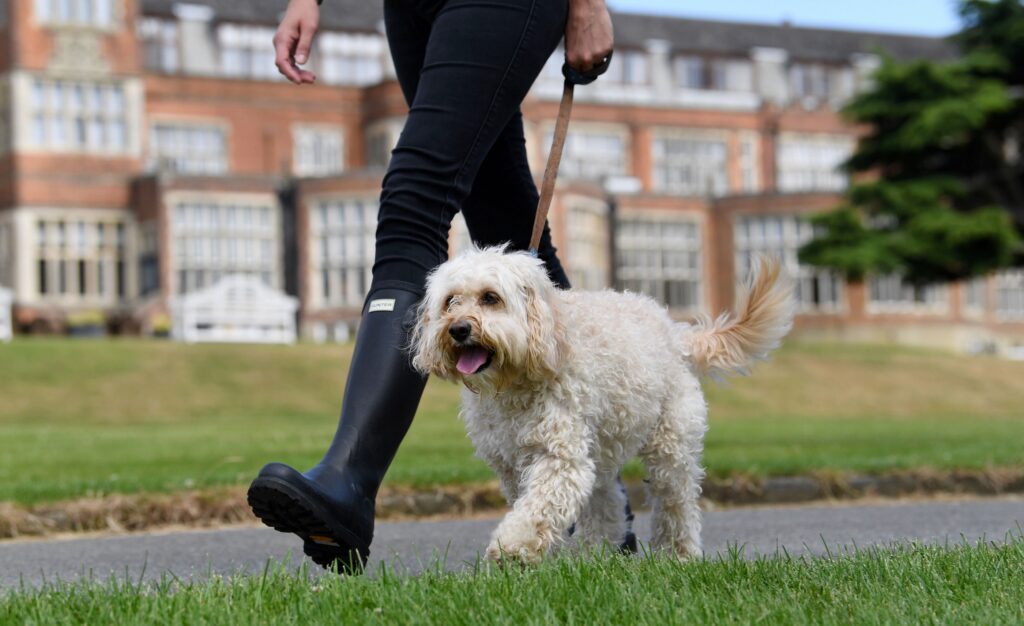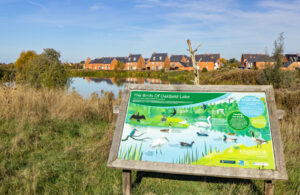New Year warning to pet owners after dog gets spooked by fireworks into terrifying accident

As New Year approaches, fireworks are soon bound to burst back into our lives once again. For one concerned pet owner, Joanne Edney, welcoming in 2025 will be a stark reminder of the New Year when her dog was spooked and seriously injured.
From the afternoon of 31 December 2021 Joanne had made sure her home was secure, the curtains closed and her dog, Rosie was as happy as could be, given the evening of fireworks ahead.
Disaster struck at 1am during the fireworks, Rosie was scared by the loud bangs and bolted down the stairs. She missed the last few steps, falling and when she landed at the bottom, Joanne knew something was seriously wrong with Rosie as she was holding her back leg up in pain. Joanne contacted Ilford PDSA Pet Hospital and was advised to bring Rosie straight in as an emergency. The veterinary team immediately gave Rosie pain relief and took x-rays.
The x-rays revealed Rosie had badly broken her left femur (thigh bone) and would need complex surgery to repair it. She also needed to be on strict rest and pain relief after the surgery to give her leg the best chance of healing. Thankfully, after several weeks of rest, pain relief and check-ups at the PDSA Pet Hospital, Rosie was back on all four paws again.
PDSA and Rosie’s owner Joanne, are hoping Rosie’s story will be a reminder to people considering letting off fireworks in their gardens to forewarn neighbouring pet owners to be prepared for New Year’s celebrations, so they can do everything possible to keep their pets safe and out of harm’s way.
PDSA Vet Nurse Gemma Renwick, said: “Many owners recognise their pets are worried about fireworks. Their senses are much more sensitive than ours. The unexpected loud bangs, and sudden flashes of light can cause distress for our four-legged family members as it’s more difficult for them to understand that they aren’t in danger.
“We see on average 1,400 pets with firework related issues such as phobias and injuries every year. Our PDSA Animal Wellbeing (PAW) Report also revealed 41% of dogs (4.1 million dogs), 30% of cats (3.3 million cats) and 16% of rabbits (160,000 rabbits) are afraid of fireworks.
“Ideally, it is best to prepare your pet several months in advance by gradually exposing them to fireworks noises, so lessening the impact firework season has. However, if you haven’t had the chance this year, there are still lots of things pet owners can do in the short term to make fireworks a less frightening experience. Simple, and easy steps, from creating a den to introducing soothing sounds, can go a long way to making this firework season a more pleasant one all round.”
The PAW Report also showcased 82% of pet owners agreed that fireworks should only be allowed on certain dates and times, as well as 71% agreeing that there should be a compulsory reduction in the noise of fireworks to make them quieter.
PDSA has created a free Firework Guide – packed with useful advice and tips – that will help make sure you’ve got everything covered for your pet to help them cope better with fireworks.
PDSA’s top tips on tackling this festive firework season:
Seek advice early – It is important to work out what is best for your pet as soon as possible. If your pet has previously struggled during fireworks, contact your vet for advice – they may be able to prescribe medication that can help.
Prepare for an ‘early night’ – be sure to walk your dog before it gets dark and keep your cat at home so you can have a cosy night in with your four-pawed family members. Bring any outdoor-living pets (rabbits and guinea pigs) into a shed, car-free garage or porch for the night.
Secure your home – keep doors, windows and cat and dog flaps closed and locked to ensure your pet doesn’t escape if scared.
Create a comfortable cosy space for hideouts – ensure your pet has somewhere they feel safe and secure, where they can hide if they want to. It’s important that your pet knows this is a safe place that they can escape to before firework season begins. For cats and dogs, you can make the space extra cosy with blankets and their favourite toys and treats, and add pillows or cushions to help absorb the loud noises. You can also do something similar with housing for smaller pets, who may appreciate some extra bedding to hide away in. If your pet chooses to hide away, let them stay hidden.
Be on hand to provide reassurance – If your pet takes comfort in attention and/or affection from you, continue to do so as you normally would – never ignore them if they’re coming to you for comfort. Reassurance can only go so far though, so ensure other steps are taken to make the night as relaxing as possible for you and your pet.
Keep calm with relaxing sounds – Playing a soundtrack to disguise the whizzes and bangs of fireworks can help to keep your pet calm. It’s also important to remain as stress-free as possible yourself in order to avoid worrying your pet.
Use a pheromone plug-in – Pheromones are scents that can help to relax and calm pets, but we can’t smell them. Some need to be plugged in a few days in advance. They are available on our PDSA pet store.
Make note of what your pet prefers most – As fireworks occur each year, it’s important to know and understand how your pet copes best during an evening of fireworks. Note down what their preferred action was, if they like to hide, next time you can ensure they have plenty of spots to hideaway in. Likewise if they seek reassurance, you can know to always be there to comfort them next time.
Prepare for next year – Once the celebrations are over for the start of 2025, prepare for the end, before 2026 is upon us. You can help your pet to learn that fireworks noises aren’t frightening over a period of several months, ahead of expected fireworks. This is call ‘desensitisation, and more info can be found here: pdsa.org.uk/fireworkready




